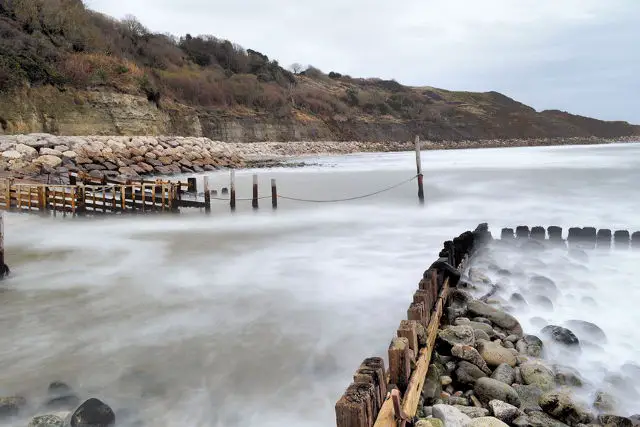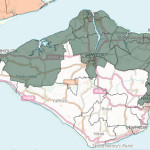The latest correspondence received was from Mike Bassett. He left the Island in 1952, now living abroad. Mike was worried that we’d think him an “old fogey who drones on and on”, but we loved his letter and the poems he’s shared with us. We hope you feel the same way too. Ed
Being an ex-Islander, I was absolutely delighted when I found this site. Fabulous!
Although I left the Island in 1952 at the age of 20, there has seldom been a day when I don’t think nostalgically of that wonderful, magical place or wish (in vain) that somehow I could once again walk those dearly loved shores and Downs.
However, I suppose that I can count myself lucky in that being a writer and poet, I have at least a medium through which I can express my deepest feelings even though (disappointingly) my works do not seem, sadly, to be of any interest to anyone else!
However, when I read your “contact” note I thought it was so inviting and friendly, that I’d like to write and introduce myself to you and send you a couple of my poems. I hope you don’t mind
Of course, it’ll be obvious from what I have already said that I am pretty long in-the-tooth now (81), but I particularly thought that as I was living in Ryde during the war years (Regina House in Union Street – the tall building with the four statues on the top of it!), the poems I wrote about those early years might be of some interest to someone. (As a toddler my parents lived in Zig Zag Road, but we moved to Ryde quite early on).
Three of these poems are attached (see below).
However, I won’t make this a long epistle as I’m not sure if it’ll interest you at all and there’s nothing worse than an old fogey who drones on and on and doesn’t realise what a bore he/she is being!
Anyway, lovely talking to you,
With kindest regards and best wishes,
Mike Thurstan Bassett
St.Catherines – Niton
Pat
Along the coast, a thick white fog
Beneath a soft blue sky:
And o’er the white and misty cliffs
A silver moon rode high;
While radiant through the vap’rous haze
In a sheen of golden light
The rising sun rose calm and fair
Dissolving star-clad night.
We walked in silence
Thro’ the still, high woods,
With the smell of the sea and the pines:
And the soft wet earth and dripping trees
Glisten’d bright with the sparkling rime.
And suddenly thro’ the clearing mist,
We glimpsed the wrinkling sea,
And watched in muted wonder
As a gleaming gull soared free.
Pure and white against the blue,
It winged the ethereal heights;
A spirit of the viewless winds,
Like poetry in flight.
And she….
She breathless stood, with parted lips
And a soft warm breeze moved her hair,
And I saw in her lovely, spell-bound eyes
That a glory was shining there.
I remember still – does she? does she?
The tang of the wind in the pines,
And the sailing moon and misty cliffs,
And the sound of the whispering sea.
And shall I forget – shall I ever forget
As laughing we ran thro’ the Chine:
And how I became an immortal
When she rested her lips upon mine?
Eternal England
My heart is in the hills of home,
And in the winds of March,
It sings within Tintagel’s foam,
And Gloucester’s soaring arch.
It floats amid the rain-wet trees,
And golden fields of corn,
O’er Kentish heights and marshy leas
By fog-bound shores forlorn.
It races o’er the sun-swept Fells,
And walks the secret lanes,
It runs upon the open Downs,
Where Saxons fought with Danes.
It laughs along the pebbled brooks,
By ancient timber’d inns,
It dances with the wind-blown rooks
And daffodils of Spring.
It lives within the knotted oak,
And burrows with the mole,
To list’ the mystic spells and charms
Of England’s quivering soul:
‘Tis lore that only her children know,
The Chosen Ones so fair,
And they alone can understand
Her invocations rare.
But while these live, we too shall live
In high immortal skies:
For if her songs such life can give,
Can England ever die?
1 – 1940 and on
“Portsmouth: Sunday, Sept., 15th 1805. At day weighed with light airs Northerly”. Extract from Nelson’s Diary written aboard the Victory before Trafalgar.
Units of the Home Fleet put into Spithead – August, 1940.
A clear, full moon and cloudless sky,
And in the gathering gloom,
Across the still and limpid sea
The silent warships loom.
The signals flash from bridge to bridge,
Like tiny, glowing sparks:
The mighty turbines slowly die –
The giants rest in the dark.
Then the wailing of the sirens,
And the deep, low drone of ‘planes,
The searchlights and exploding bombs,
And Portsmouth crowned in flames:
And etched against the ghostly light
Of a gently falling flare,
The Victory’s masts rise gaunt and black
In the brilliant, silver glare
Of another Trafalgar – here.
The stench of a burning city;
And the rolling banks of smoke,
As a tanker slowly settles,
And her clawing seamen choke,
And on the beach next morning,
‘Mid the charr’d and oily dross,
The body of a merchantman
Tattooed with a rose and cross.
The joy of search – and finding,
A burnt-out One-O-Nine,*
The stab of fear as the Stukas* struck (more)
Like screaming hawks in line.
Long vapour trails that smudge and fade
In the blue and lovely skies
Where, like an angel’s shining sword,
The sylphine Spitfires wait:
The swarming blocks of bombers,
That scab the sky with mange,
And stepped-up high in the warming sun
The glinting fighters range:
Or standing high on the roof-top,
By the “Grecian” statues tall,
To watch the raucous Flying-Bombs*
In sudden silence fall.
Or diving, in a cricket match,
On coils of rolled-up wire,
As a Junkers roared at tree-top height,
Machine-guns blazing fire.
And later still, the exuberant Yanks,
Who came from “Over there” – “swell!”
The Memphis Belles who gave us gum –
And gave their lives as well.
The massed armada of shipping
On D-Day mines One;
And the heavy, foreboding silence
That descended when all had gone
To meet their fates on the beaches
And the white-hot cauldron of Caen.
And now and then, through tears and cheers,
“A nightingale sang in Berkeley Square”,
But where, O where have the people gone.
And where, O where the years?
One-O-Nine. Messerschmidt 109E-3. Main German fighter in the Battle of Britain.
Stuka. Junkers 87B dive-bomber
V-1 short for Vergeltungwaffe Eins. Nicknamed the Doodlebug
Image: Darren Irving under CC BY 2.0





